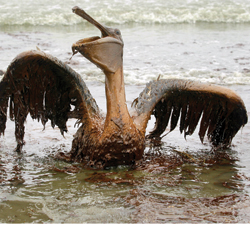Lawyers See Both Promise and Problems in $20B Gulf Coast Compensation Fund

Note: The related CLE, “The Price of Oil,” is Wed., Aug. 18.
The legal repercussions from the BP oil spill in the Gulf of Mexico are spreading quickly. But like so many other aspects of the catastrophe, it is hard to predict where the legal battles will lead—and impossible to say when, or how, they will end.
By the end of June, with the closure of vast stretches of federal fishing waters, and with tourism plummeting along the U.S. Gulf Coast, emergency claim centers established by BP already had been flooded with some 87,000 requests for compensation to keep mortgages paid, businesses afloat and families fed.
And those may be just the leading edge of the claims that will come in as the well blowout 5,000 feet below the surface of the Gulf continues to spew oil with sickening regularity despite all efforts so far to stop it. When this story went to press in early July, there had been no successful attempts to limit the flow of oil.
The importance of getting money in a timely fashion to people hurt by the spill is widely acknowledged. “For the small-business owners, for the fishermen, for the shrimpers, this is not just a matter of dollars and cents,” said President Barack Obama in a statement issued in mid-June during talks with BP officials. “A lot of these folks don’t have a cushion.”
No one wants to see a replay of the two-decades-long litigation that followed the 1989 Exxon Valdez oil spill in Alaska’s Prince William Sound, which was notorious for being the worst oil spill in U.S. waters—until BP’s Deepwater Horizon rig exploded April 20 some 40 miles off the Louisiana coast.
That’s why the agreement hashed out in June between Obama and BP Chairman Carl-Henric Svanberg to create a $20 billion compensation fund for Gulf spill victims was hailed as a way to bypass potential legal logjams and distribute funds quickly and efficiently. BP agreed to add additional money to the fund if compensation costs exceed $20 billion.
The fund also can be used to pay other judgments and settlements, cover state and local cleanup costs, and help salvage threatened natural resources.
The Gulf Coast Oil Spill Claims Facility will be administered by attorney Kenneth R. Feinberg of Washington, D.C., founder and managing partner of the mediation firm Feinberg Rozen. Feinberg has been involved in a number of notable claim settlements in recent years, including being appointed as administrator of the $7 billion Sept. 11 Victim Compensation Fund. (See “The Go-To Mediator.”)
Feinberg is empowered to decide what standards to apply in disbursing money from the fund to claim ants. “I may use applicable state law or maritime law or other government law in order to leave open the possibility of applying a third standard,” he said during an interview with the ABA Journal on June 26. Those comments appeared to back away from earlier statements suggesting that he might rely primarily on the law of each claimant’s home state to guide his compensation decisions.
Click the link to continue reading “The Price of Oil” in the August issue of the ABA Journal.



